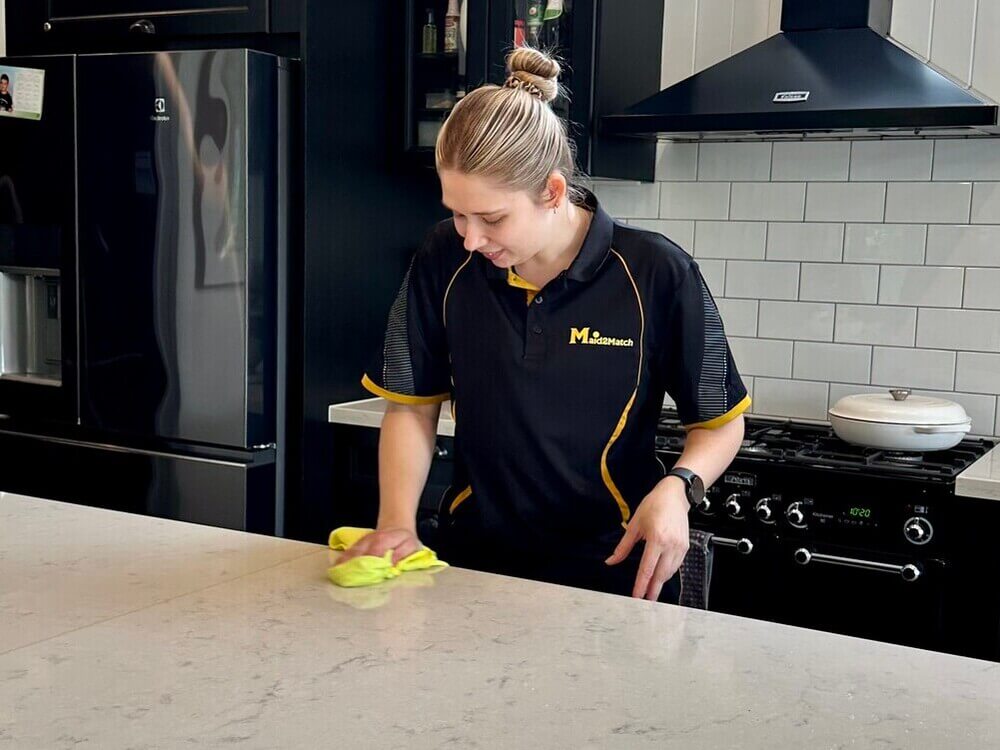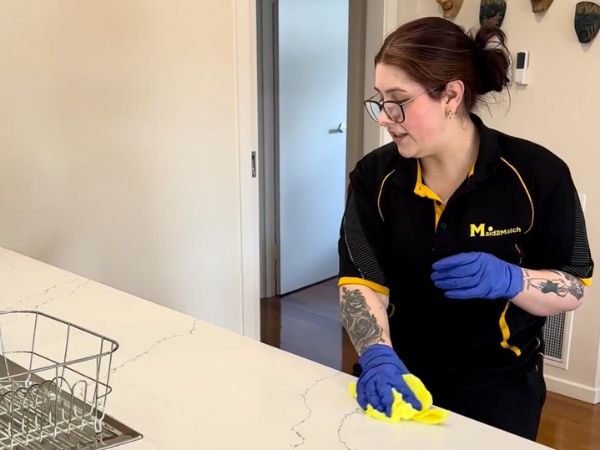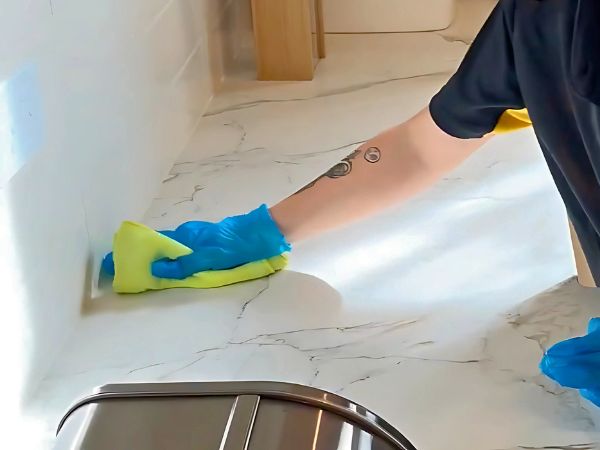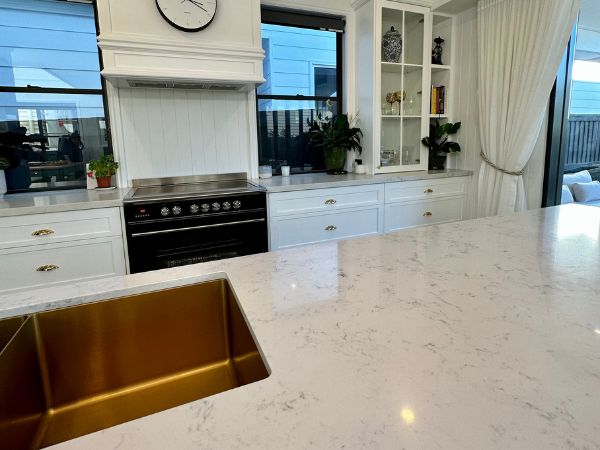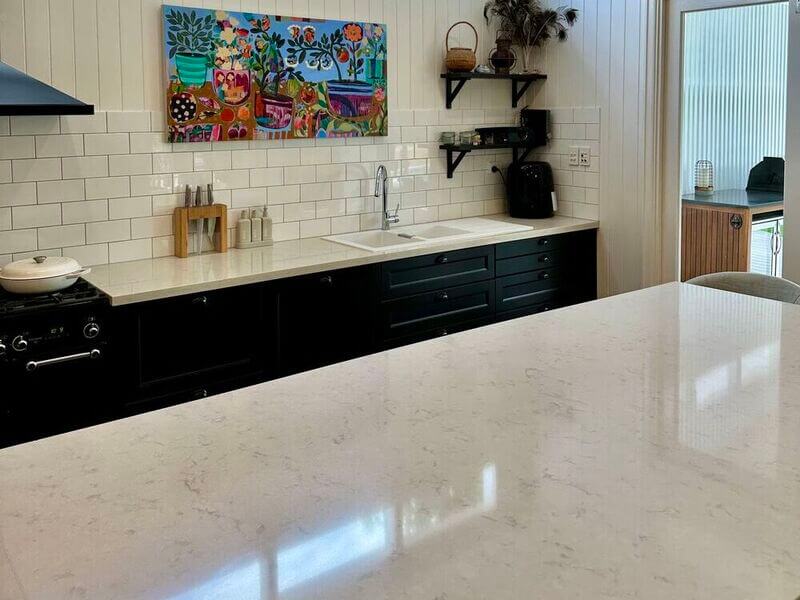Nothing makes a kitchen feel more luxurious than a marble benchtop. It’s a true statement piece that can elevate your space!
But let’s be honest — that beauty comes with a little extra care.
Spilled coffee, a splash of wine, or a streak of tomato sauce can seep into the stone and ruin the flawless finish.
Luckily, you don’t always need expensive marble cleaning products to keep your benchtop looking pristine.
For daily upkeep, a mix of dish soap and warm water is your best friend. Household items like baking soda or hydrogen peroxide can also help with tougher stains.
In this blog, we’ll tell you exactly how to clean marble benchtops, so you can stop stressing over every little mess.
Before Cleaning | Best Ways to Clean Marble Benchtops | Removing Stains | Polishing | Sealing | Care Tips
How Often to Clean Marble Benchtops
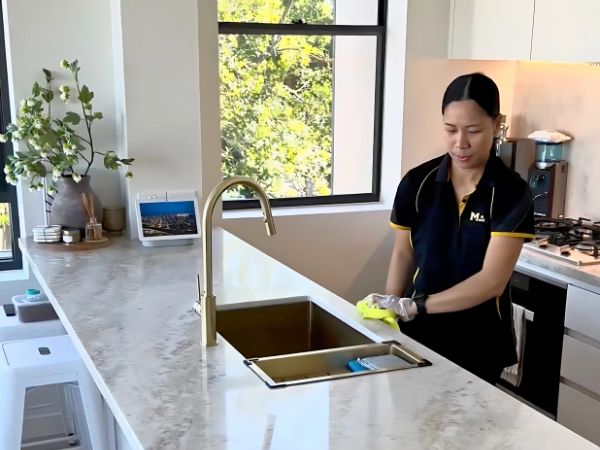
Regular cleaning will help keep your marble benchtop looking brand new.
To prevent permanent staining, tackle any mess and spills immediately.
Also, wipe the benchtop right after use or at least once a day.
Then do a deeper clean weekly. Pay attention to areas that are often overlooked, like under appliances.
If it feels like too much, don’t hesitate to book a professional housekeeper for a little extra help.
Aside from tidying your benchtop, they can also handle general kitchen upkeep!
Before Cleaning Marble Benchtops
Before cleaning your marble benchtop, it’s worth understanding its properties.
Like granite, marble is a natural stone. It’s loved by many for its timeless appeal, with each slab featuring unique veining patterns.
Marble is also durable and heat-resistant, which is why it’s often used for kitchen benchtops, floors, and walls.
But since it’s a natural material, it’s quite delicate and needs gentle care.
Do marble benchtops stain easily?
Marble benchtops are porous, especially if not properly sealed.
This means that they can absorb spills like coffee or tea, unlike engineered stone benchtops with a non-porous surface.
When left too long, stains can set and become tougher to get out.
Marble is also softer than other stones (3–5 on the Mohs hardness scale). It can be scratched easily, and the damage is often immediately noticeable.
What should you not clean marble with?
Marble contains calcium carbonate, which can make it prone to etching.
That can happen when acidic substances touch the stone surface and react with the calcium, leaving a permanent stain behind.
That means you should not clean marble benchtops with vinegar, or anything acidic like citric acid or lemon juice.
Moreover, avoid harsh chemicals like ammonia or bleach — these can discolour the surface.
Also, skip abrasive scrubbers like steel wool and rough sponges that can scratch the stone.
To prevent any damage, test your cleaning method first on a tiny, hidden area. That way, you can be sure it’s safe for your marble benchtop.
Preparing your marble benchtop for cleaning
Start by clearing the benchtop. Remove any solid food bits and objects that might get in the way of cleaning.
If you’ve spilled something, grab an absorbent material such as a paper towel or soft cloth. Place it over the spill area to blot the liquid.
Do not wipe, as that can spread the mess or push the substance deeper into the marble stone.
The Best Ways to Clean Marble Benchtops
Cleaning marble benchtops can feel intimidating if you don’t know which methods are safe.
To take out the guesswork, here’s what you can use on marble surfaces:
- Dish soap
- Baking soda
- Hydrogen peroxide
- Rubbing alcohol
- Specialised pH-neutral marble cleaner
To avoid scratches, always wipe with a soft sponge or microfibre cloth. And don’t forget to dry the surface to prevent water spots!
Cleaning marble benchtops with dish soap
For daily maintenance, dish soap is all you need to clean your marble benchtop.
Just mix a little dish soap and warm water in a bowl or a spray bottle. Dampen a soft cloth with the soapy water, and wring it out well so it’s not dripping.
Gently wipe the marble benchtop’s surface, focusing on any stained areas.
Be sure to rinse any soap residue with a separate damp towel, then follow up with a dry cloth.
Cleaning marble benchtops with baking soda
Baking soda is a gentle but effective cleaner for marble benchtops. It’s mildly abrasive with a slightly alkaline pH, so it won’t damage the surface.
It’s also safe for dark-coloured marble benchtops and won’t cause fading.
For everyday stains, mix baking soda and a bit of water to make a thick paste. Spread it over the spot, and wait for 15–20 minutes.
Remove any baking soda residue with a damp cloth. Then, wipe the marble benchtop dry to avoid streaks.
Cleaning marble benchtops with hydrogen peroxide
Placed raw meat on your marble benchtop? You can disinfect it with 3% hydrogen peroxide!
Just keep in mind that hydrogen peroxide works best on light to white marble benchtops. If yours is darker, do a spot test first, as it can sometimes fade the colour.
Mix 1:1 parts water and 3% hydrogen peroxide in a spray bottle. Mist the surface, then wait about a minute.
Wipe the marble benchtop with a damp cloth, then dry everything thoroughly.
Cleaning marble benchtops with rubbing alcohol
Another way to disinfect your marble benchtop is with 70% rubbing alcohol.
However, using it undiluted too often can wear down the sealant, so it’s best to water it down or use it sparingly.
Mix equal parts 70% rubbing alcohol and water in a spray bottle. Apply it onto the surface, and let it sit for a minute.
Rinse off any leftover rubbing alcohol with a damp cloth, and follow up with a dry towel afterwards.
Cleaning marble benchtops with a stone cleaner
A specialised pH-neutral cleaner for natural stones is a safe and easy way to keep your marble benchtop in great shape.
Always follow the instructions on the label so you don’t damage the surface.
You’ll also find commercial marble cleaners that target specific stains like oil, mould, or rust.
How to Remove Stains from Marble Benchtops
To remove stains from your marble benchtop, act quickly before they set!
For light marks, diluted dish soap might be all you need.
For tougher marks, here’s what to use:
ORGANIC STAINS (e.g. coffee, wine): Mix 1 part 3% hydrogen peroxide and 2 parts baking soda. Apply it to the stain, cover with a plastic wrap, and leave it for 24 hours.
OIL STAINS: Use a thick paste of baking soda and water, and let it sit for 20–30 minutes. (In a pinch, you can also substitute baking soda with cornflour or talcum powder.)
MOULD: You can remove mould from your marble benchtop with 3% hydrogen peroxide. Apply it directly to the area, then wait 10 minutes before wiping it away.
INK STAINS: Dip a cotton pad or swab into 70% rubbing alcohol. Gently dab (don’t rub!) the ink until it lifts.
RUST STAINS: Start with a thick paste of baking soda. If that doesn’t work, use a commercial rust remover made for marble. Follow the product instructions thoroughly.
When you’re done, always remove any residue from the cleaner with a damp cloth. Finish by drying the surface thoroughly.
Keep in mind that DIY methods may not work on heavy discolourations. In these cases, it’s best to contact your stone supplier for advice.
Polishing Marble Benchtops
Whenever your marble benchtop starts looking dull, give it a quick polishing to bring back some shine.
But keep in mind that a DIY buffing won’t fix deep etch marks and scratches.
For those, it’s best to call in a stone care professional, as trying to fix them yourself can make the damage worse.
Start by cleaning your benchtop thoroughly. Then, apply a pH-neutral marble polish, following the label instructions.
Using circular motions, buff the surface with a soft microfibre cloth. Work in sections so you don’t miss a spot.
Afterwards, wipe off any residue with a damp cloth, then dry the area thoroughly.
Sealing Marble Benchtops
Since marble surfaces are porous, they need to be sealed to prevent liquids from seeping through.
You might need to have your benchtop resealed every 6–12 months, but the exact timing depends on how often it’s used.
To check if it’s time for resealing, drop some water onto the marble surface. If it beads up, your seal is still intact.
If the water soaks in and leaves a dark patch, it’s time for a retouch.
Ideally, use impregnating or penetrating sealers that are labelled safe for marble.
You can apply them yourself, but a professional can ensure a smooth, clear finish.
More Tips to Care for Your Marble Benchtop
Cleaning stone benchtops might be tricky as they’re naturally prone to stains — but a few simple habits can help!
Even if you don’t use your marble kitchen benchtop often, regularly clean it with a soft cloth to remove dust.
Always use a cutting board when preparing food, and place a soft liner under heavy appliances to protect the finish.
Moreover, marble surfaces can be damaged by excessive moisture and heat.
Avoid leaving wet cloths on the benchtop, and always use coasters for hot cookware.
FAQs About Cleaning Marble Benchtops
Need more tips to maintain your marble benchtop’s sleek look? Check out these Q&As!
What is the best cleaner for marble benchtops?
The best cleaner for your marble benchtop is mild dishwashing liquid mixed with warm water.
You can also use a product designed for natural stones.
Always make sure that your marble cleaner has a neutral or mild pH level to avoid damaging the surface.
Can you use Windex to clean marble?
You should not use Windex to clean marble.
Like many commercial household cleaners, Windex may contain harsh chemicals like ammonia. Some formulations also have vinegar.
These ingredients are acidic and can permanently etch marble stone surfaces.
For daily maintenance, use a pH-neutral stone cleaner or dish soap mixed with warm water.
Can you use a steam cleaner on marble benchtops?
Using a steam cleaner on marble benchtops is not a good idea!
Too much moisture and heat can damage the stone’s sealant and expose the porous surface.
This can lead to more etching and discolouration over time.

